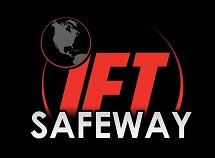The freight brokerage industry offers a dynamic and rewarding career path. Two primary options for aspiring professionals are becoming an independent freight agent or working directly for a freight brokerage. Each path presents unique opportunities and challenges. Here are some pros and cons of both roles, highlighting how independent freight agent opportunities can align with your career goals, especially with the support of a freight brokerage like IFT Safeway.
Independent Freight Agent Opportunities
An independent freight agent is a professional who partners with an agent-based freight brokerage like IFT Safeway, using their brokerage license to arrange freight transportation and leverage the company’s support services. By collaborating with IFT Safeway, independent agents can own and operate their own business while focusing on their expertise — moving freight. Meanwhile, IFT Safeway provides crucial back-office support, including billing customers, paying carriers, and other essential administrative tasks.
Pros of Being an Independent Freight Agent
- Flexibility and Autonomy
- Higher Earning Potential
- Valuable Entrepreneurial Experience
One of the most appealing aspects of being an independent freight agent is the freedom it offers. You can set your own schedule, choose your clients, and operate from virtually anywhere. This autonomy allows you to balance work and personal life more effectively.
Independent freight agents typically earn higher commissions than their counterparts working for a brokerage. Since a fixed salary does not bind you, your income directly reflects your performance and the volume of business you handle. Earning potential can be significant with the right strategies and a solid client base.
Operating independently provides valuable entrepreneurial experience. You gain insights into various aspects of running a business, from marketing and sales to customer service and financial management. This experience can be invaluable if you decide to expand your business or venture into other entrepreneurial activities in the future.
Cons of Operating as an Independent Freight Agent
- Initial Startup Investment and Risk
- Administrative Responsibilities
- Limited Support
- 1099 Filing
Starting as an independent freight agent requires an initial investment in tools, technology, and marketing. Additionally, a degree of financial risk is involved as you build your client base and establish your reputation in the industry. As an independent agent, you are responsible for all administrative tasks, including invoicing, compliance, and customer service. These additional responsibilities can be time-consuming and may detract from your primary focus on freight brokerage. Unlike working for a brokerage, where support is readily available, independent agents must often navigate challenges independently. However, partnering with a supportive freight brokerage like IFT Safeway can mitigate this drawback by providing essential resources and guidance.
Working for a Freight Brokerage
Working for a freight broker involves a dynamic role where you manage and coordinate the transportation of goods for clients. You work within a structured framework as an employee, leveraging the brokerage’s established systems and extensive network to ensure efficient logistics operations. Your responsibilities include negotiating rates with carriers, scheduling shipments, tracking deliveries, and resolving any issues during transit.
The Pros
- Stability and Support
- Training and Development
- Networking Opportunities
Working for a freight brokerage offers greater stability, including a fixed salary, benefits, and a structured work environment. You have access to established systems, processes, and a support team, which can help you focus on your core responsibilities without worrying about administrative tasks. Freight brokerages often provide extensive training and professional development opportunities. This structured learning environment can be beneficial, especially for those new to the industry, as it helps build foundational knowledge and skills.
Being part of a brokerage gives you access to a broader network of industry professionals and clients. This can be advantageous for building relationships and expanding your career opportunities within the company or the industry at large.
The Cons
- Limited Earning Potential
- Less Flexibility
- Limited Autonomy
While the stability of a fixed salary is a pro, it can also be a con if you seek higher earning potential. Commissions and bonuses are often capped, limiting your income compared to the unlimited earning potential of an independent agent. Working for a brokerage typically means adhering to a fixed schedule and company policies. This lack of flexibility can be restrictive, especially if you value work-life balance and the ability to set your hours.
You may have less control over your work processes and client interactions as an employee. Company protocols and policies dictate how you conduct business, which can frustrate those who prefer a more autonomous working style.
Choosing between becoming an independent freight agent or working for a freight brokerage depends on your career goals, risk tolerance, and preferred working style. Independent freight agent opportunities offer greater flexibility, higher earning potential, and entrepreneurial experience but come with increased responsibility and risk. Conversely, working for a brokerage often offers more stability, support, and structured professional development, but it comes with less autonomy and capped earnings.
IFT Safeway supports independent freight broker agents by offering essential resources and support to navigate the challenges of operating independently. With competitive, fast-pay commissions, quick customer and carrier setups, and real-time posting to load boards, partnering with IFT Safeway as an independent agent gives you the best of both worlds — behind-the-scenes support and flexibility to grow your business. By carefully weighing the pros and cons of each path, you can make an informed decision that aligns with your professional aspirations.
